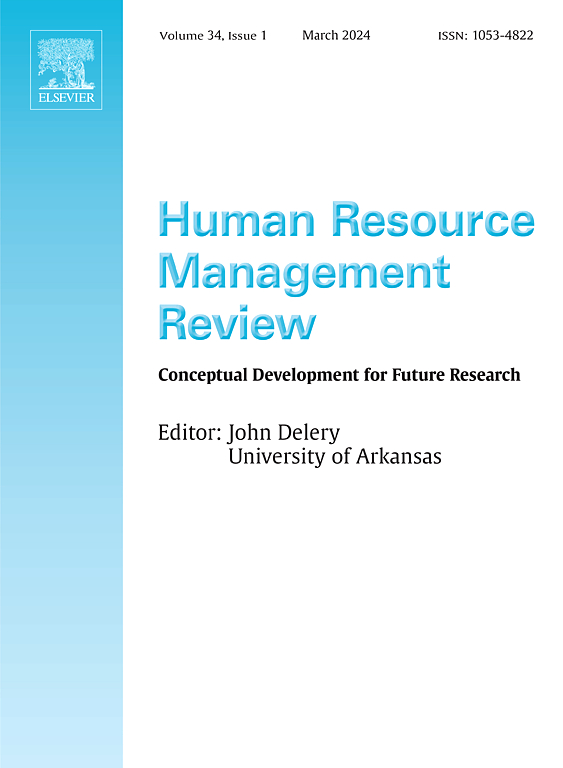Time to voice? A review and agenda for longitudinal employee voice research
IF 13
1区 管理学
Q1 MANAGEMENT
引用次数: 0
Abstract
This article presents a systematic literature review of 256 longitudinal studies found from two major databases to examine employee voice, involvement, participation, and silence within organisations. We first explore the development of employee voice as an academic subject of study and then explain how similar constructs, like involvement, participation, and silence have been incorporated to our review. We investigate how the compiled longitudinal articles examine, analyse, and explain how voice is elucidated through a study over time. We find that most longitudinal studies do not explicitly place importance on the notion of time when examining voice. We then compile well-cited models and voice frameworks to explain voice longitudinally. We focus on the importance of time and discuss how exploring voice through a temporal lens will be a step forward in understanding the dynamics within an organisation. In reviewing the features of existing longitudinal research in the field of voice and applying some key components of existing models (Marchington et al., 1992; Townsend et al., 2020), we develop and apply a broader voice framework that can incorporate different organisational elements, including process and outcomes over time. We also propose a future research agenda for longitudinal studies in employee voice.
该发言了吗?纵向员工语音研究综述与议程
本文对来自两个主要数据库的256项纵向研究进行了系统的文献综述,以检查组织内员工的声音、参与、参与和沉默。我们首先将员工声音的发展作为一个学术研究主题进行探讨,然后解释如何将类似的结构(如参与、参与和沉默)纳入我们的研究。我们调查了汇编的纵向文章如何检查、分析和解释声音是如何通过一项研究随着时间的推移而被阐明的。我们发现,大多数纵向研究在检查声音时没有明确地重视时间的概念。然后,我们编译被广泛引用的模型和语音框架来纵向解释语音。我们将关注时间的重要性,并讨论如何通过时间透镜探索声音将是理解组织内部动态的一步。在回顾现有语音领域纵向研究的特点和应用现有模型的一些关键组成部分时(Marchington et al., 1992;Townsend等人,2020),我们开发并应用了一个更广泛的语音框架,可以结合不同的组织元素,包括随着时间的推移的过程和结果。我们还提出了未来对员工声音进行纵向研究的研究议程。
本文章由计算机程序翻译,如有差异,请以英文原文为准。
求助全文
约1分钟内获得全文
求助全文
来源期刊

Human Resource Management Review
MANAGEMENT-
CiteScore
20.20
自引率
7.00%
发文量
0
审稿时长
48 days
期刊介绍:
The Human Resource Management Review (HRMR) is a quarterly academic journal dedicated to publishing scholarly conceptual and theoretical articles in the field of human resource management and related disciplines such as industrial/organizational psychology, human capital, labor relations, and organizational behavior. HRMR encourages manuscripts that address micro-, macro-, or multi-level phenomena concerning the function and processes of human resource management. The journal publishes articles that offer fresh insights to inspire future theory development and empirical research. Critical evaluations of existing concepts, theories, models, and frameworks are also encouraged, as well as quantitative meta-analytical reviews that contribute to conceptual and theoretical understanding.
Subject areas appropriate for HRMR include (but are not limited to) Strategic Human Resource Management, International Human Resource Management, the nature and role of the human resource function in organizations, any specific Human Resource function or activity (e.g., Job Analysis, Job Design, Workforce Planning, Recruitment, Selection and Placement, Performance and Talent Management, Reward Systems, Training, Development, Careers, Safety and Health, Diversity, Fairness, Discrimination, Employment Law, Employee Relations, Labor Relations, Workforce Metrics, HR Analytics, HRM and Technology, Social issues and HRM, Separation and Retention), topics that influence or are influenced by human resource management activities (e.g., Climate, Culture, Change, Leadership and Power, Groups and Teams, Employee Attitudes and Behavior, Individual, team, and/or Organizational Performance), and HRM Research Methods.
 求助内容:
求助内容: 应助结果提醒方式:
应助结果提醒方式:


